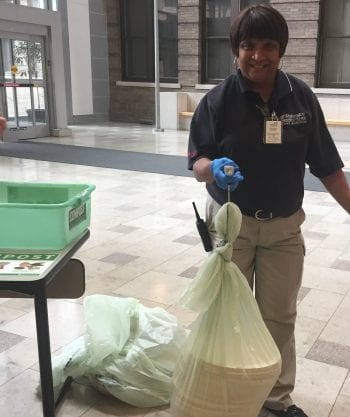Throughout each semester, the medical students at WashU School of Medicine attend daily lunch lectures. The Operations and Facilities Management Department (OFMD) recently supported the Student Sustainability Group in their effort to reduce the waste footprint for these catered events for the first 2 weeks, when lecture attendance is highest. The student group’s leader, Alex Scott, used the group’s annual funding to purchase compostable plates and cutlery to replace any landfill-disposable products that the outside caterers may have provided to serve with their meals. OFMD staff assisted with the waste sorting portion after the lecture and lunch concluded.

Barbara Keaton, the Area Supervisor for Custodial Services Day Shift weighs a bag of compost. Barb has been a member of the WashU community for over 25 years and in the Operations and Facilities Management Department for the past 5 years.
The waste sorting service was provided for 7 events. Each event served between 100-125 people, totaling nearly 800 meals served. All plates, cutlery, scraps of food waste, and paper towels were composted. The recycling component typically included miscellaneous items that the students brought with them, such as plastic cups and paper documents. For these events, diversion rates exceeded 95% through composting (100+ pounds or 78% of total waste) and recycling (25 pounds or 19% of total waste). Landfill waste, which primarily included sauce packets, wet plastic bags, and snack packaging that students brought to the event, accounted for just 4 pounds, or less than 3% of total waste.
This effort aligns with the university-wide goal to sort and compost waste from events with more than 500 people. While each individual lunch only served 125 or less, the total number of meals served was beyond 500. Different student groups sponsored the lunches and each hired a different caterer. Information about food packaging for each caterer was recorded (plastic versus aluminum, plastic bags for transport, etc.) and caterer flexibility (ability to reduce cost of service if we declined plastic utensils). In the future, this information can inform event planners about “green” caterer options and hopefully influence local caterers to adopt sustainable practices in their daily operations.
Alex Scott was the driving force behind this major waste sorting achievement. Second year medical student from Chico, CA, Alex decided to come to WashU because of the welcoming atmosphere and focus on research. He plans to pursue a career in neurosurgery. His interests in sustainability, particularly waste reduction, stem from his home life and his mother’s dedication to reusing and recycling around their home: “As a society I think we are moving toward a generation of sustainable resource use and clean energy, but the speed at which we get there depends on each individual’s contribution. If my extra 30 seconds sorting waste and promoting water conservation speeds up the pace, I certainly think it is worth it and it is no sweat off my back.”